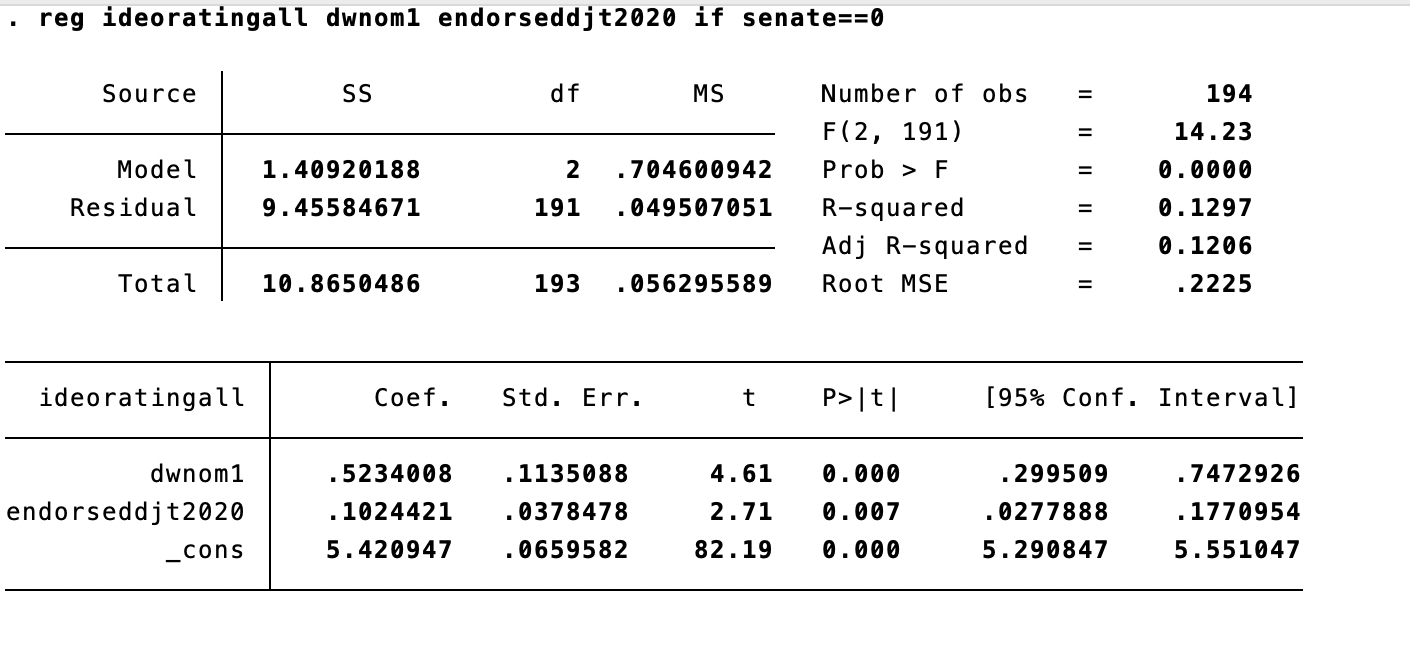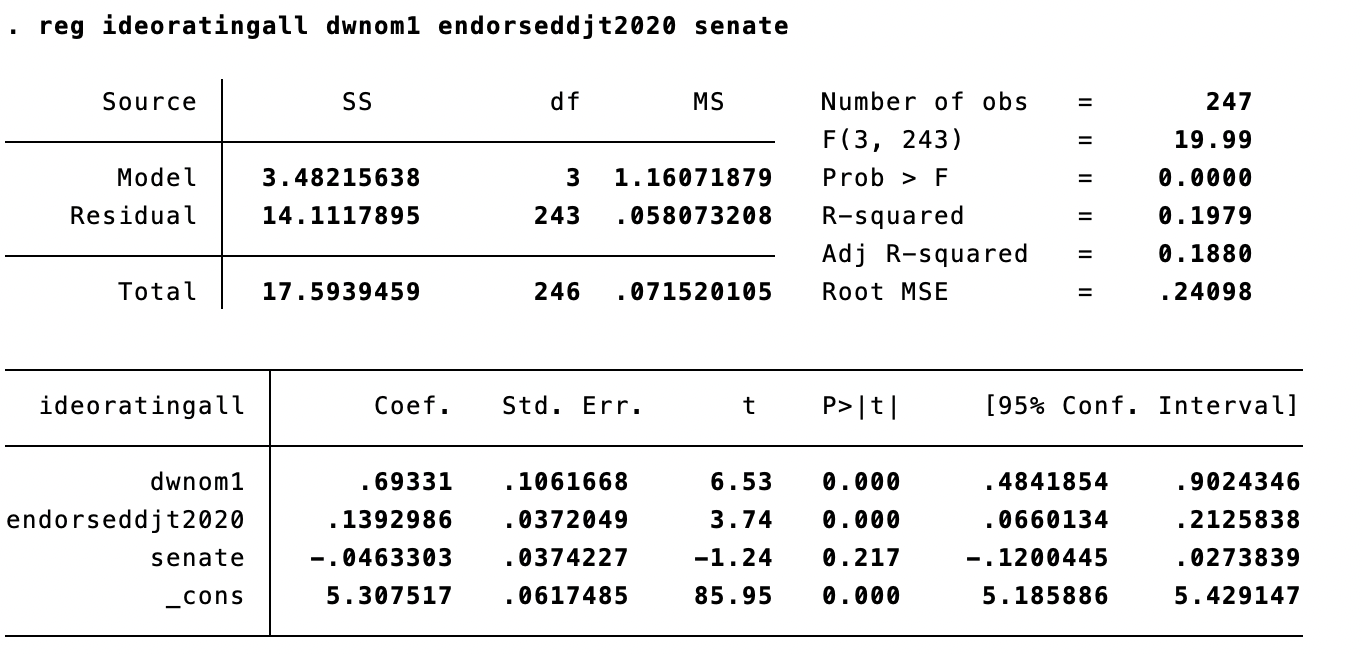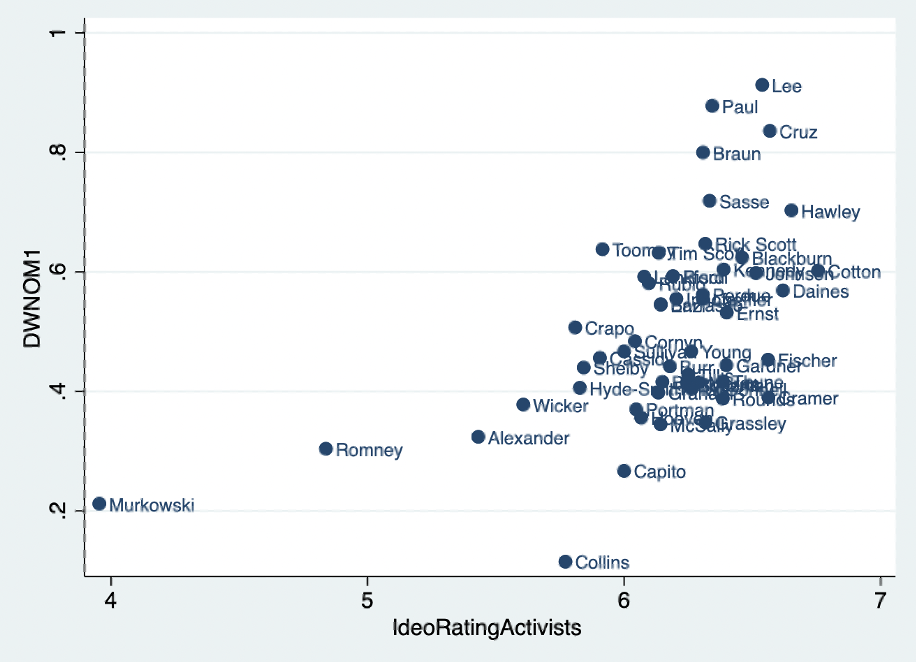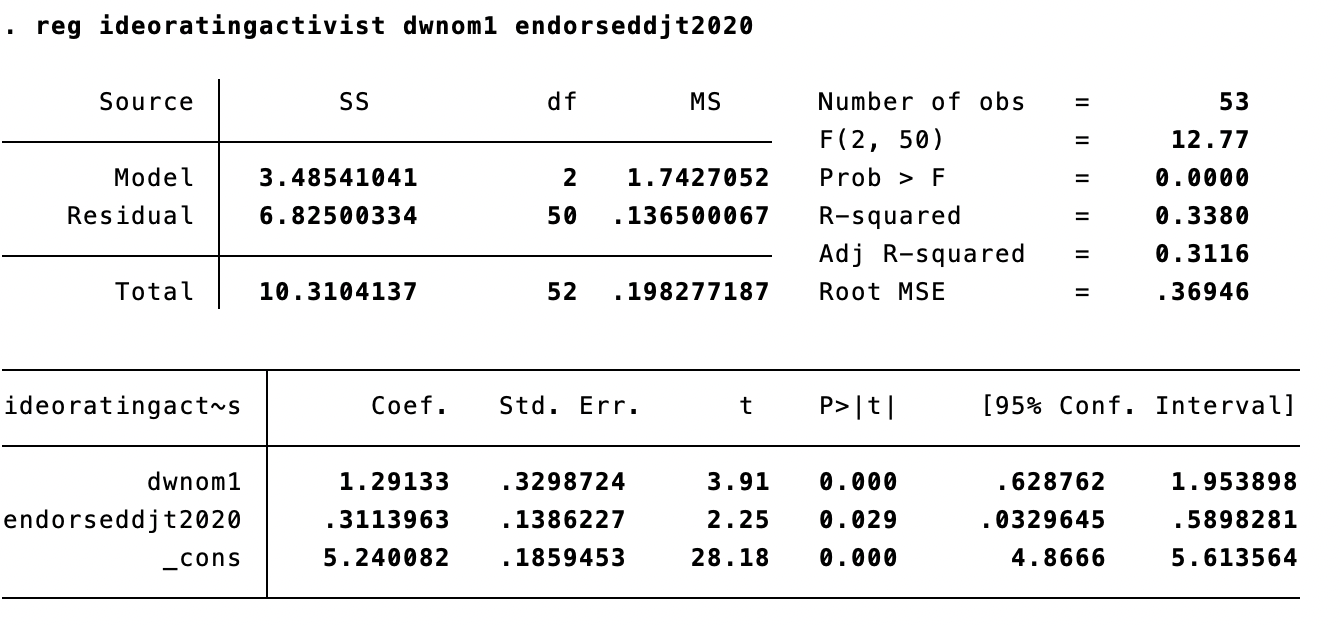|
Continuing my extension of the work by Noel and Hopkins, I'm finally done compiling the CCES data on how people rate their House member (the previous post was how they rate their Senators). Since there are way more House members in the US, this gives me a larger N size. However, the ratings themselves aren't as good. Even though the CCES has 60,000 respondents, when you actually break it down by individual district, there aren't THAT many respondents per district- and some districts are sparse meaning they will have very few respondents. Because of this, I wasn't able to subset the data by "activists" vs. "non-activists". Doing so would REALLY limit the number of respondents making these ideological judgements. So I've got a lot of people making these ratings who may not be super familiar with politics and their legislator. However, much of that will be captured by the people who chose "Don't Know" (whom I discarded). Anyway, these are the regression results! The regression above is for House members only. The DV is the average ideology score (1=Extremely liberal, 7=Extremely conservative) and the IVs are each legislators' DW Nominate Score (first dimension) and whether they endorsed Trump in 2020. Both are highly significant. There seems to be something about endorsing Trump- separate from someone's actual voting record- that accounts for some movement on the ideology scale. Legislators who endorsed Trump are seen as more conservative, although the coefficient is relatively small. Let's see what happens when we COMBINE the data from the Senate and the House together to increase the statistical power. Again, it seems as though endorsing Trump makes people perceive the Congressman/woman as more conservative. This effect is unique from someone's voting record. I also have a dummy for whether people in the Senate are just considered more conservative than members of the House. They are not, and the coefficient is negative.
So what does this tell us and what does it NOT tell us? Well, there may be something about "closeness to Trump" through endorsing him in 2020 that makes people view their Congress person as more conservative. But we cannot show causality here. Perhaps people who endorsed Trump were in more vulnerable districts and suddenly started waxing poetic about conservative policies in their campaigns in order to bring out the Republican base. We don't know. That's why I plan to run something experimental in the near future and test whether there's a causal mechanism at play.
3 Comments
My sabbatical work asks the simple question "Has Donald Trump changed the meaning of "conservatism" for the mass public?" A couple authors have started to look into this question- or have found evidence that speaks to this question while studying ideology. Noel and Hopkins have a great forthcoming article that samples activists, asking them to make pairwise comparisons between Republican Senators to determine which is the more conservative of the two. They then use those scores to create a unidimensional scale of ideology. They found that Senators who criticized Trump in 2016 were considered more moderate, despite conservative voting records. They also use some 2016 CCES data to show this pattern. I'm replicating some of their work as a first step in my project, which has three stages. Stage 1: Does standing against Trump/criticizing Trump make a Republican- regardless of their actual ideology as measured by their voting record-appear more moderate to the mass public? Does associating/supporting Trump make a politician appear more conservative- regardless of their voting record? Here's a first cut at the CCES 2020 data which asks respondents in every state to rate their Senators on a 7 point scale going from "Extremely liberal" (1) to "Extremely conservative" (7). Below are the ratings from activists only. "Activist" is operationalized as any respondent who said they engaged in at least 3 political activities (donating, working for a campaign, putting up a yard sign etc.) in the last 12 months. These people will be more likely to actually know about their Senators which means they are less likely to take a random guess and introduce real noise in the data. The perceived ideology scores are plotted against the Senators DW Nominate scores in the first dimension. Most of the ratings pass a basic face validity test- at least comparatively. Murkowski and Romney ARE more moderate in their voting records and are rated as such by the activists. Collins, who votes quite moderately though, is rated noticeably more conservative than the other two. This is perhaps because she equivocated a great deal on Trumpism, and ultimately sided with him sometimes. Note that this survey was administered PRIOR to the second impeachment trail in which Collins voted to impeach (she did not vote to impeach during the first impeachment). Above is a regression - with an admittedly small N size- that regresses the activist ratings onto two variables: the DWNominate score (first dimension) and whether the Senator endorsed Trump in the 2020 election. In initially included a variable for whether TRUMP endorsed THE SENATOR for the 2020 election, but since many Senators were not up for re-election, this variable is not ideal. But we do see some significance on the variable of whether the Senator endorsed Trump- which anyone was able to do. We see even more significance on this variable if we use the ratings from all respondents rather than just the activists.
I might try to add the data from 2018 to this analysis when some other anti-Trump members such as Jeff Flake were still in office. Stay tuned. |
AuthorWrite something about yourself. No need to be fancy, just an overview. Archives
February 2022
Categories |




 RSS Feed
RSS Feed
